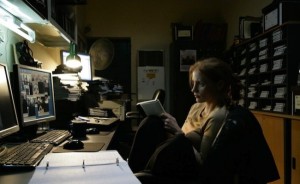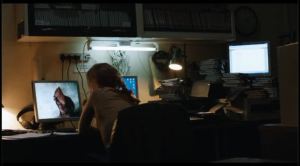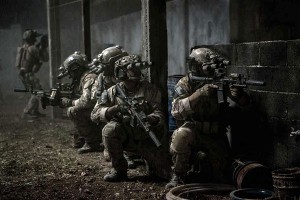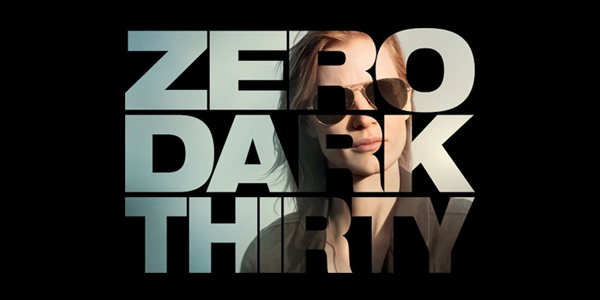Happy belated New Year everybody. I hope your 2013 has gotten off to a great start, as mine has, at least in a pop culture-binging sort of way. Yes, awards season fervor is in full swing, as evidenced by my liveblog, and subsequent breakdown of the Oscar nominations. I also had the great pleasure of getting to review the fourth season premiere of Justified, one of my favorite TV shows that's as good as ever. It'll probably be my only writeup for the show until it inevitably makes my best of 2013 list, the way it did for my best of 2012 (plug!). And of course, there's my review for Zero Dark Thirty, which should be required viewing, if only to let you jump in on all the juicy debate raging online about whether it's pro-torture, anti-torture, or even any good. That's all for now, but expect my ranking of the Best Picture nominees just as soon as I get back from my Amour screening.
Review: Zero Dark Thirty

Storytelling is, by its nature, manipulative, and plenty of great movies are so because they know how to twist your perceptions to their purpose. A well-crafted, emotional workout, whether thrilling, tear-jerking, or comical, makes for one hell of an experience, and the degree of pleasure you get from letting a movie works its magic on you will cement its place in your mind. But then there’s the other class of great movie, the kind that demands you pull your own weight, and meet it as an equal, no matter how unsettling doing so might be. These films aren’t made to go down smoothly; they come sharpened and barbed, designed to stick inside your head, and make you bleed from the inside, until you’re wondering why you didn’t just watch the stupid Hollywood dress-up movie with name like Gangster Squad.
In reliving the exhaustive manhunt for Osama Bin Laden, Zero Dark Thirty could only ever exist among the latter class of films, regardless of whether or not it turned out to be great, which it most certainly is. Expanding the “boots on the ground” style that won her Best Director and Best Picture titles for The Hurt Locker, Kathryn Bigelow, and writer Mark Boal, turn their focus to the defining conflict of the last decade, exploring a fight against terrorism by American intelligence agencies that’s as dangerous, and wearying, as any war without clear borders or armies would be.

The film opens two years after 9/11, in one of the many off the books black sites the C.I.A. is operating on foreign soil. “This is what defeat looks like,” barks one of their operatives, as he waterboards a detainee who has clearly been through this routine, and much worse, already. Looking on is recent transfer Maya (Jessica Chastain), a wispy young woman who looks like she might get carried off by a strong desert wind. Her small frame and soft face belie a fierce purpose, one that Chastain is always subtly telegraphing, when not letting it be unleashed in full. Maya is our guide, of sorts, through the next ten years, as her globetrotting journey is made to mirror that of the real life analyst who was largely responsible for finding Bin Laden.
It is through her eyes that we come to understand how inadequate the greatest intelligence resources in the world were when it came to finding one man, especially since doing so became less of a priority as the search dragged on, and domestic security concerns grew as threats went to ground. With so many painful memories to draw from, Zero Dark Thirty has no difficulty in uncovering the raw nerves accumulated over a tumultuous decade, but its daring comes from willing to strike those wounds, again, and again. The results are more than a little upsetting, as they ought to be.

Bigelow and Boal have taken on an unenviable task here, as they set out to compress an era’s worth of fleeting victories, political turmoil, and empty-handed frustration into two and a half hours. While a departmental effort to apprehend a killer might bring to mind cop dramas –and sure enough, sources are “interrogated,” red herrings get rundown, and the hunters often rank among the causalities- the film eschews a traditional thriller structure, often feeling more like a series of chronological vignettes (complete with intertitles) that build towards one moment.
The diffuse narrative would make Zero Dark Thirty as episodic and unfocused as something like The Master, were it not so charged with real history. It rarely lingers on one scene or event for too long, leaping ahead years at a time to showcase how the ongoing battle of attrition is evolving. It’s reminiscent of David Fincher’s Zodiac, another film about a seemingly fruitless hunt for a famed murderer (each employs audio recordings set against a black backdrop, denoting tectonic cultural shifts with striking effectiveness). Both films weigh down one side of a scale with a boogeyman, giving the individuals and nation tasked with finding him the high ground. But the longer, and more desperate the search becomes, the more the avengers give of themselves, and the balance starts to tip. When all is said and done, what is accomplished must be measured against where the scale stands, something Zero Dark Thirty isn't afraid to do.

The film has kicked up quite a controversy over its depiction of torture. The opening fifteen minutes continue the earlier mentioned waterboarding scene with a detail and intensity that’s disturbing, but not exploitative. These sequences, and there are plenty of them, serve to provoke a reaction out of the audience, one that is then tempered by the events that follow. Critics will point to how the brutal actions of C.I.A. spooks helped lead (in circuitous fashion) to the eventual discovery of Bin Laden’s compound, and how hand-tied the agency looks when trying to confirm his presence without the use of “enhanced interrogation.”
To call this a tacit endorsement of torture, however, is bafflingly simplistic. Yes, the film demonstrates the hard truth that physical and mental abuse of a person can cause them to give up information, but the actionable value and validity of that information is always in question. Zero Dark Thirty doesn’t paint with a black and white brush; instead, it asks the audience to consider if there's a point where our hope for a silver bullet to terrorism exceeds our duty to not commit unforgiveable acts against other human beings, or if such things even exist. It all comes together in the film’s breathless finale, a near-real time recreation of the Navy SEAL strike against Bin Laden’s compound in Abbottabad. Bigelow is excellent at shooting dialogue and information delivery, but here she confirms her status as a world-class director of action, not in terms of giant explosions and gunfights, but in capturing people as they make momentous decisions through movement.

When the events that transpired in the early minutes of May 2nd do occur, and the last shots have been fired, your reaction will vary, and this is the film’s crowning achievement. For some, it will be a cathartic release for ten years’ worth of bided rage, a cinematic reminder of the relief that came in 2011. Don’t be surprised if you hear an audible whooping in your theatre. For others, though, the moment will be utterly empty, a success qualified to the edge of irrelevance, and delayed past the point of gratification. Beyond its technical prowess, superb cast, and tight script, Zero Dark Thirty is a great film because it doesn’t tell you what to think. It’s a harrowing, unforgettable assault, summed up by one final, devastating look from Chastain that asks, “Was it worth it?” That’s up to you to decide, which may take some time. Zero Dark Thirty is meant to be chewed over, and swallowed hard, to leave your stomach clenched, and teeth set on edge. You can spit it out, but you won't escape the lingering taste of smoke and ashes.
5 out of 5
Zero Dark Thirty
Directed by Kathryn Bigelow
2012, USA

